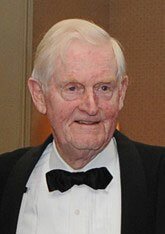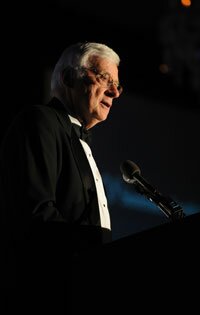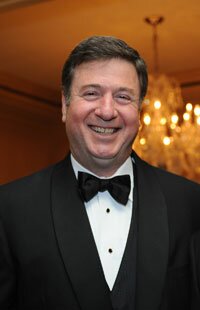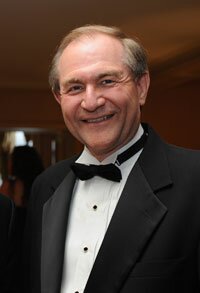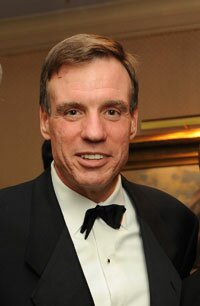COVER- Racing for Richmond: Three Dems are neck-and-neck, but can they run all the way to the governor's mansion?
And they're off in the 2009 running of the Democratic gubernatorial primary!
At first it was supposed to be a two-horse race between Delegate Brian Moran of Alexandria and State Senator Creigh Deeds. Then in January came a last minute addition to the running, former Democratic National Committee chair Terry McAuliffe, fresh off placing in the 2008 Democratic presidential primary, leading the hard-charging campaign of then-Senator Hillary Clinton.
In the first turn, McAuliffe jumps out to an early lead with a multi-million dollar campaign effort, and appears to still be going strong. The latest SurveyUSA poll of likely primary voters found McAuliffe up 16 points over Deeds and Moran, but there were still 18 percent undecided!
But no, here comes Moran! A recent poll from Research 2000 finds Moran in front at 24 percent, with McAuliffe at 19 percent and Deeds at 16 percent, with a whopping 41 percent undecided! It's anybody's race!
Look out now, now it's Deeds coming on strong! In hypothetical Survey USA match-ups with former attorney general and uncontested Republican nominee Bob McDonnell, Deeds bests his Democrat opponents, losing only by a slim five points with a 2.7-point margin of error!
And down the stretch they come! With only a month left until the June 9 primary, who will hold on to be the Dems' nomination?
Gay rights: Moran's watershed– or Waterloo?
BY
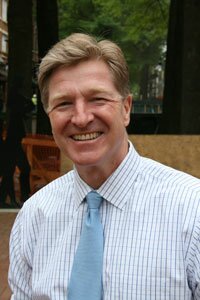
Brian Moran wants to repeal "Marshall-Newman," the state's constitutional ban on gay marriage.
PHOTO BY HAWES SPENCER
A little over two years ago, a solid majority of Virginians voted to ban gay marriage, but today one of the four candidates for governor wants to repeal the ban.
"Not only does Brian Moran's position mark a sea change, but look at the other two candidates," says political prognosticator Larry Sabato. "While opposed to gay marriage, they seem to be in favor of civil unions. Go back 10 years– nobody advocating gay civil unions could have been elected statewide."
A recent Washington Post/ABC poll shows for the first time that more Americans favor gay marriage– 49 percent– than oppose it– 46 percent.
And already several states are moving in that direction. In April, Iowa's Supreme Court declared that state's ban unconstitutional, the same month that state senates of both Maine and New Hampshire approved gay marriage.
"Society is changing dramatically on the issue of gay and lesbian rights," says Sabato. "I see it in the classroom. Young people have adopted gay rights as their civil rights movement."
One person who welcomes Moran's stand is Virginia Evans. An information executive at UVA, she flew to San Francisco last September to wed her partner and lauds Moran for his "controversial stand in Virginia." Whatever today's voters do, she thinks history will reward Moran for seeking repeal.
"Sometime soon," says Evans, "you're going to look pretty stupid for not supporting it– sort of like the people who opposed civil rights."
As for Moran himself, he says he was particularly bothered by the reach of Virginia's ban. The measure– dubbed the Marshall-Newman Amendment for its sponsors– forbade not just marriage but also certain contracts among members of same-sex relationships.
"I was opposed to it and thought it a dark day when it passed," says Moran. "I don't believe we should place discriminatory language in our constitution."
So where does this leave the other two nomination-seeking Democrats? When asked about the issue, both Creigh Deeds and Terry McAuliffe seem to prefer to talk about getting the economy back in shape.
"I have always been personally in support of civil unions," says McAuliffe. "However, the voters of Virginia sent a clear message in 2006. What we need to do now is hold the line and make sure we are offering full contractual rights for domestic partners."
As for Deeds, he voted for Marshall-Newman as a member of the State Senate.
"Creigh voted to give Virginians a choice," explains his press secretary, Brooke Borkenhagen. "In the month leading up to the general election, he spoke out against it and actively campaigned against it."
And yet, Borkenhagen confirms that Deeds is not now campaigning for repeal.
"At this point, with the make up of the General Assembly," she says, "there's no way it's going to pass."
So will Moran's stance help him or hurt him?
"It helps him in the primary in June," predicts Sabato. "It hurts him in the general election in November.
"The assumption is that because he's supporting the repeal of the amendment, he'll get a large turnout of liberal Democrats in places like Northern Virginia," says Sabato. "But in the general election, [Republican] Bob McDonnell will use it against him. Virginia did pass it with a 57 percent majority, after all."
–with additional reporting by Lindsay Barnes
Rematch? Could Virginia's closest election get an encore?
BY

Only 360 votes separated Bob McDonnell (R) and Creigh Deeds (D) when they ran against each other for attorney general in 2005.
ILLUSTRATION BY ALLISON SOMMERS
It was the closest, most hard-fought campaign ever contested in statewide Virginia politics. Headed into Election Day 2005, polls indicated the race for attorney general between Delegate Bob McDonnell (R) of Virginia Beach and State Senator Creigh Deeds (D) of Bath County was a statistical dead heat. And with the votes counted and the dust settled on November 8, the winner was... still unknown.
The first count had McDonnell defeating Deeds by a mere 323 votes, but the difference was so small that state law mandated a recount. It took a whole 43 days worth of recounts to finally determine that McDonnell had indeed edged out Deeds. The official margin turned out to be just 360 votes out of a total of 1,941,602 cast. At a margin of .01 percent, it was the closest statewide election in modern Virginia history, according to the State Board of Elections.
Now, after a four-year term as the Commonwealth's top law enforcement officer, McDonnell stands unopposed as his party's nominee to become the next governor while Deeds remains deadlocked in a three-way battle for the Democratic nomination.
After an initial contest that went into overtime, might Deeds overcome his primary opponents and get a rematch against McDonnell?
"You could make the case that Deeds is the strongest Democrat for November," says UVA professor and political pundit Larry Sabato. "I'm amazed that Deeds has not stressed to a greater degree how close he came last time, under more adverse conditions for a Demcorat."
What's changed in the four years since Deeds and McDonnell's last contest is a Virginia electorate that's leaning further left, as evidenced by President Obama handily winning the Commonwealth– 52 to 46 percent– in last year's race for the White House.
"There have been three fundamental changes," says Sabato. "The first is that the Democratic party identification among 18-29 year olds is higher than it's ever been in Virginia, and their turnout is only going to get higher with each passing year as they age.
"The second is that those voters with graduate degrees, particularly in the Northern Virginia and Tidewater areas, are voting Democratic in greater numbers, largely because of social issues like abortion and gay marriage where they see the Republicans as extreme.
"The third is that minority populations– African-Americans, Latinos, Asian-Americans, Muslims, and Jews– are all voting in greater numbers, and 75 percent of them voted Democratic in the last election."
Still, Sabato says, McDonnell still has one big advantage over all three would-be Democratic nominees, including Deeds.
"On one side you have an internal fight going on," says Sabato, "while McDonnell waits on the other side raising money for November."
Still, if Deeds does manage to emerge victorious in June, his rural roots may just be enough to win the governor's mansion and settle his score with McDonnell.
"At this point," says Sabato, "Republicans are left with white males and rural voters in their base. If Deeds can just be competitive in those rural areas and win, say, 46-47 percent of the vote, he makes it nearly impossible for McDonnell to win."
Against the tide: Virginia's contrarian trend
BY
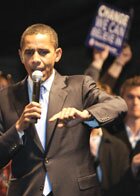
Can Obama's popularity overcome a decades-long trend of Virginia voting against the president's party?
FILE PHOTO BY TOM DALY
Virginia Republicans haven't had much to cheer lately. In the last eight years, they've lost the governor's mansion, both U.S. Senate seats, and in 2008– for the first time since 1964– a Democrat carried Virginia in the presidential election.
Nevertheless, Republicans have at least one reason to look forward to Election Day '09: the contrarian trend. Ever since John Dalton's election as governor in 1977, the last eight gubernatorial elections have gone against the party that most recently won the presidential election.
"What's remained true since 1977," explains UVA professor and political pundit Larry Sabato, "is that the Virginia governor's race is, in effect, a midterm election; and the natural reaction in any midterm election is anger against the party in the White House."
Sabato explains that it isn't the case Virginians as a whole have a natural grudge against the sitting president.
"The people who are the angriest are the ones who show up to vote in the greatest numbers," says Sabato. "Inevitably, a president is going to make decisions that make some people angry, and people who are pleased with the president stay home in disproportionately greater numbers."
Still Sabato warns that Virginia's against-the-grain tendencies aren't a sure thing and that the cross-state and cross-country popularity of President Obama might carry the Democratic gubernatorial nominee through to November.
"Part of this trend is simply circumstance," says Sabato. "It isn't an iron-clad rule, and eventually someone could break it. It could even be this year."
Hey, weren't you the governor?
BY
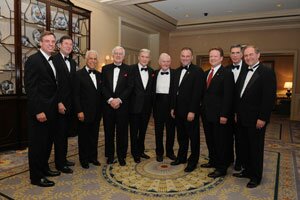
Seen here at last year's Sorensen Institute Gala, every living governor of Virginia (plus a couple of interlopers). From left to right: Mark Warner, George Allen, Doug Wilder, Gerald Baliles, non-governor and former U.S. Senator John Warner, Linwood Holton, Tim Kaine, non-governor and U.S. Senator Jim Webb, Chuck Robb, and Jim Glimore.
PHOTO BY LINDSAY BARNES
For four years we come to know them, and then they're term-limited out of the public consciousness. Sometimes they return to run for office again, others choose to stay in the private sector, but they're all still in the Commonwealth. So what are they doing now?
Linwood Holton(R)
Inaugurated: 1970
Left office: 1974
Where is he now? Since becoming the first Republican governor of Virginia since Reconstruction, Holton has never again held public office. He unsuccessfully ran for the Republican nomination for U.S. Senate in 1978 that ultimately went to John Warner. In the intervening years, Holton has fallen out of love with the GOP of today and has campaigned on behalf of several Democratic candidates including President Barack Obama and Governor Tim Kaine–- who also happens to be Holton's son-in-law. Last year, Holton, 85, published his memoirs in the book Opportunity Time.
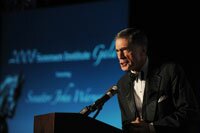
PHOTO BY JEN FARIELLOChuck Robb (D)
Chuck Robb (D)
Inaugurated: 1982
Left office: 1986
Where is he now? After serving two terms as Virginia's junior member of the U.S. Senate, Robb, 69, has become a much-sought after member of bipartisan panels studying foreign policy. In 2003, President Bush appointed the Vietnam veteran to co-chair the Iraq Intelligence Committee, and again to the 2005 Iraq Study Group. Presently residing in McLean, Robb now teaches part-time at the George Mason University School of Law. More than 40 years after their glamorous White House wedding, he is still married to President Lyndon B. Johnson's daughter, Lynda.
Gerald Baliles (D)
Inaugurated: 1986
Left office: 1990
Where is he now? Ending his governorship on a note of high popularity, Baliles was long rumored to be a potential candidate for the U.S. Senate, and was even thought to be a possible Democratic candidate for president in 1992. However, the Baliles, 68, never ran again for public office. After becoming a partner in the Richmond law firm of Hunton & Williams, Baliles became the director of the University of Virginia's Miller Center for Public Affairs in 2005 and plans to convene a group this summer to study the future of newspapers.
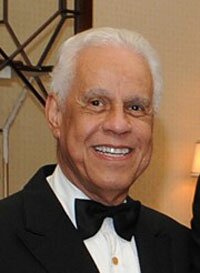
PHOTO BY JEN FARIELLODoug Wilder (D)
Doug Wilder (D)
Inaugurated: 1990
Left office: 1994
Where is he now? After becoming the first African-American governor in the nation's history, Wilder stayed out of running for elected office for a decade. Then in 2004, the king of unpredictable decided to run for Mayor of Richmond and won with 79 percent of the vote. During his four years in office, however, Wilder proved a controversial mayor, often butting heads with the Richmond City Council, and once going so far as to evict Richmond's school board from City Hall. Wilder, 78, left office in January, opting not to seek a second term.
George Allen (R)
Inaugurated: 1994
Left office: 1998
Where is he now? Allen waited two years after his governorship to make his next political move, running against and then defeating fellow former governor Chuck Robb for his seat in the U.S. Senate in 2000. Despite a first term in which Allen was a much-rumored candidate for the White House in 2008, Allen was upset in his re-election bid by Jim Webb in 2006. Allen, 57, continues to be active in politics, having actively campaigned for Sen. John McCain's presidential bid in 2008 and appears frequently on cable television talking up conservative causes.
Jim Gilmore (R)
Inaugurated: 1998
Left office: 2002
Where is he now? Five years after leaving office, Gilmore returned to elective politics in a big way in April 2007, when he announced he was running for the Republican nomination for president. Despite a campaign built on representing "the Republican wing of the Republican Party," Gilmore dropped out of the race a mere three months later. Then, just as quickly as he had disappeared, four months later Gilmore re-emerged as a candidate for the U.S. Senate, ultimately losing that race last year to his gubernatorial successor Mark Warner. Presently, Gilmore splits his time between the Richmond and D.C. areas, serving as president of USA Secure, a Washington homeland security think-tank, and sitting on the board of the National Rifle Association.
Mark Warner (D)
Inaugurated: 2002
Left office: 2006
Where is he now? From the moment he watched Governor Tim Kaine sworn in as his successor in 2006, Warner enthralled political junkies as a potential presidential candidate for 2008. Warner even went so far as to make visits to the key early primary states of Iowa and New Hampshire, and he set up a political action committee to explore the possibilities of a White House bid. Then, Warner abruptly announced in October 2006 that he would not seek the presidency, citing a wish to spend more time with his family. He wasn't gone for long, though. In September 2007, Warner announced his candidacy for the U.S. Senate, and he ultimately won the 2008 race over former governor Jim Gilmore by a whopping 31 points. Since going to Capitol Hill, the man who made his fortune in cell phone licenses has won seats on the prestigious budget, rules, banking, and commerce committees.
CORRECTION: In the print edition of this story, George Allen's name ran under Mark Warner's photo due to a production template error. It has been corrected in this online edition.
#
